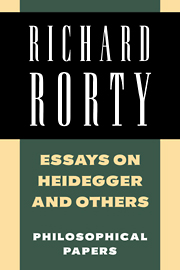Book contents
- Frontmatter
- Contents
- Acknowledgments
- Introduction: Pragmatism and post-Nietzschean philosophy
- Part I
- Philosophy as science, as metaphor, and as politics
- Heidegger, contingency, and pragmatism
- Wittgenstein, Heidegger, and the reification of language
- Heidegger, Kundera, and Dickens
- Part II
- Part III
- Index of names
Heidegger, Kundera, and Dickens
Published online by Cambridge University Press: 14 January 2010
- Frontmatter
- Contents
- Acknowledgments
- Introduction: Pragmatism and post-Nietzschean philosophy
- Part I
- Philosophy as science, as metaphor, and as politics
- Heidegger, contingency, and pragmatism
- Wittgenstein, Heidegger, and the reification of language
- Heidegger, Kundera, and Dickens
- Part II
- Part III
- Index of names
Summary
Imagine that the nations which make up what we call “the West” vanish tomorrow, wiped out by thermonuclear bombs. Only Eastern Asia and sub-Saharan Africa remain inhabitable, and in these regions the reaction to the catastrophe is a ruthless campaign of de-Westernization – a fairly successful attempt to obliterate the memory of the last three hundred years. But imagine also that, in the midst of this de-Westernizing campaign, a few people, mostly in the universities, squirrel away as many souvenirs of the West as they can – as many books, magazines, small artifacts, reproductions of works of art, movie films, videotapes, and so on, as they can conceal.
Now imagine that, around the year 2500, memory of the catastrophe fades, the sealed-off cellars are uncovered, and artists and scholars begin to tell stories about the West. There will be many different stories, with many different morals. One such story might center around increasing technological mastery, another around the development of artistic forms, another around changes in sociopolitical institutions, and another around the lifting of sexual taboos. There would be dozens of other guiding threads which story tellers might seize upon. The relative interest and usefulness of each story will depend upon the particular needs of the various African and Asian societies within which they are disseminated.
If, however, there are philosophers among the people who write such stories, we can imagine controversies arising about what was “paradigmatically” Western, about the essence of the West. We can imagine attempts to tie all these stories together, and to reduce them to one – the one true account of the West, pointing the one true moral of its career.
- Type
- Chapter
- Information
- Essays on Heidegger and OthersPhilosophical Papers, pp. 66 - 82Publisher: Cambridge University PressPrint publication year: 1991
- 21
- Cited by

